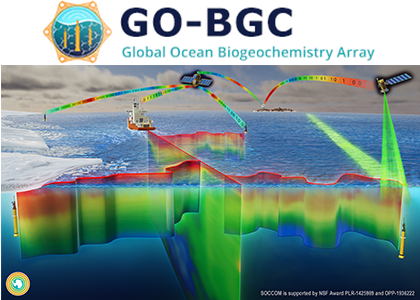Please join us for the quarterly GO-BGC webinar, hosted by the US Ocean Carbon and Biogeochemistry Project Office. This webinar will be focused on high-latitude ocean biogeochemistry by exploring the research of two groups that participated in the 2023 GO-BGC/BGC Argo Float Data Workshop at the University of Massachusetts Boston. The webinar will begin with an update on the status of the GO-BGC float array, followed by two short presentations. We’ll then close with a community discussion and Q and A session. Recordings will be available on the OCB and GO-BGC websites.
REGISTER HERE
Agenda for May 9, 10 AM Pacific / 1 PM Eastern:
- Yui Takeshita (Monterey Bay Aquarium Research Institute, USA, yui@mbari.org):
An update on the GO-BGC program
- Daniel Koestner (University of Bergen, Norway)
Biogeochemical properties of the Lofoten Basin Eddy from 14 years of BGC-Argo float data
Oceanic eddies are typically short lived but are a crucial physical phenomenon supporting heat and nutrient exchanges across water bodies. The Lofoten Basin Eddy (LBE) is a seemingly permanent topographically constrained anti-cyclonic eddy situated in the northern Norwegian Sea containing relatively cool surface waters and consistently warmer subsurface waters. As such, the conditions in the LBE may drive significantly different biogeochemical processes than the surrounding waters. Here we examine the unique biogeochemical signatures of the LBE with the 14-year timeseries of BGC-Argo float observations. We describe methodology for float-eddy colocation and examine differences in key biogeochemical parameters inside and outside of the eddy, including organic carbon export.
- Sophie Shapiro (University of California San Diego, USA)
Lessons and opportunities from the Southern Ocean Sea Ice team at the 2023 GO-BGC Float Data Workshop
In the winter of 2023, the Southern Ocean reached a record low sea ice extent anomaly. This unprecedented low sea ice coverage coincided with the August convening of the GO-BGC float data workshop. What insights could a cohort of motivated researchers uncover with two working days and the BGC Argo dataset? In this talk, we present preliminary data from BGC floats deployed in the Southern Ocean marginal sea ice zone. We illustrate the potential of the observational network to investigate further questions about the dynamics and impacts of changing sea ice. Finally, we highlight insights and challenges from the GO-BGC workshop to demonstrate the further potential of collaborative data working groups.
- Discussion





